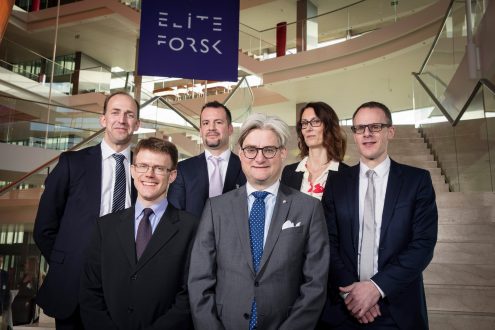The Elite Research Prizes 2018 honor basic research
Two researchers associated with the Danish National Research Foundation were among the recipients of this year’s five Elite Research Prizes, all of which were awarded to researchers who conduct excellent basic research. The director of the DNRF welcomed the recognition of the importance of basic research as did one of this year’s prize recipients, Professor Anja Groth.

On Thursday, March 1, this year’s Elite Research Prizes were awarded during a conference in Copenhagen’s Opera House. The five Elite Research Prizes are awarded by the Ministry of Higher Education and Science to world-class researchers under 45 years of age, and this year, all the prize-winners excel in basic research in their respective fields.
Among the prize recipients was Professor N. Asger Mortensen, who is affiliated with the Center for Nanostructured Graphene (CNG) at DTU. Mortensen is working on the interaction between light and matter at nanoscale level, and he has been a part of the CNG since the center’s start in 2012.
Another of the prize recipients was Professor of Molecular Biology Anja Groth, whose research group for several years was a significant part of the Center for Epigenetics (CfE), which was based at the University of Copenhagen from 2007 to 2017.
“Congratulations to Anja Groth, N. Asger Mortensen, and the other three prize recipients. It is a great acknowledgment of the fundamental importance of basic research in society that all five recipients this year conduct basic research at a top international level,” said Søren-Peter Olesen, director of the Danish National Research Foundation.
Groth: Essential that knowledge can be valuable in itself
Professor Groth, of course, welcomed the recognition of the work done by her research group and asked that people remember the importance of basic research, especially because Denmark is one of the frontrunners in many basic research areas.
“It is incredibly important that the great political landscape recognizes the importance of understanding completely basic processes. It is essential that there is also room for knowledge to be valuable in itself without being directly applicable. The more knowledge we get fundamentally, the more options will open up in the long term, “said Groth to the DNRF. She added:
“One must remember that the individual researcher does not stand alone with their explanation of how the world works, but that we constantly build on each other’s discoveries and investigate how our results fit together. Therefore, it is so important to invest widely in all aspects and areas of a research field.”
Center grants provide freedom and room for the research to grow
Continuing her comments, Professor Groth emphasized the importance of long-term funding with considerable freedom:
“For me as a researcher, the major center grants are more flexible funding. Of course, you have an overall goal, but you’re also allowed to re-prioritize within the framework. The center grant is a more general support of your research, where the individual researcher is believed in and trusted in our ability to see how we can move the borders of our knowledge today in the best way possible. It really provides you with freedom and room to put your effort into longer and more ambitious research projects, instead of working towards fast results that can secure you the next grant,” said Groth about her experience of being part of a Center of Excellence.
“In addition, it is a clear advantage to be formalized in a large research center, because it creates a natural coherence between the different research groups and a social and academic environment that fosters interdisciplinary collaborations and increases the efficiency,” Groth concluded.
